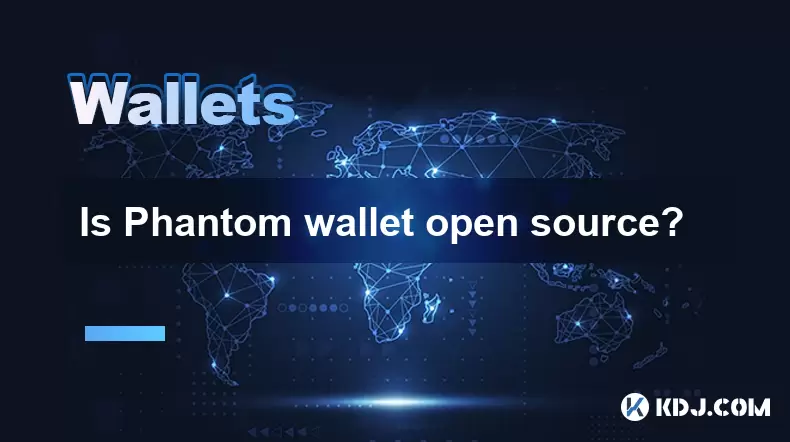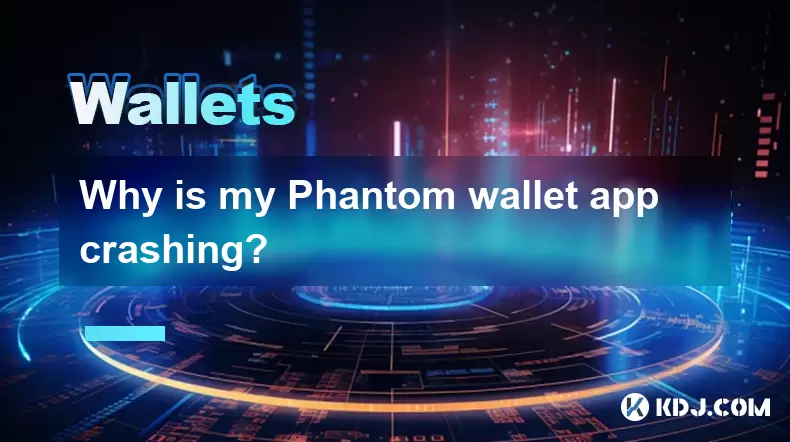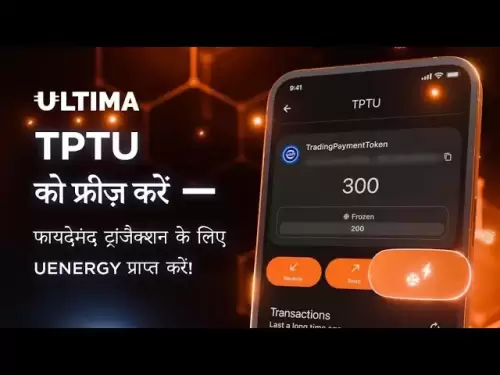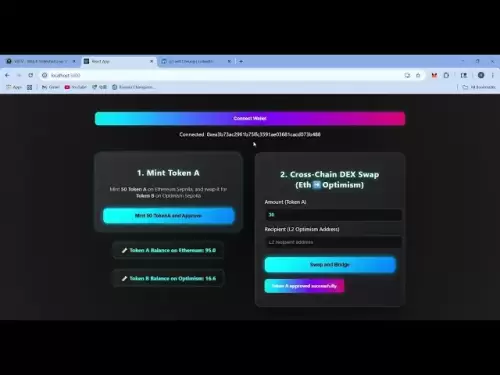-
 Bitcoin
Bitcoin $109,459.7682
2.44% -
 Ethereum
Ethereum $2,598.6052
6.29% -
 Tether USDt
Tether USDt $1.0003
0.00% -
 XRP
XRP $2.2734
3.95% -
 BNB
BNB $661.4886
1.58% -
 Solana
Solana $155.4825
4.35% -
 USDC
USDC $0.9999
-0.02% -
 TRON
TRON $0.2838
1.04% -
 Dogecoin
Dogecoin $0.1740
8.25% -
 Cardano
Cardano $0.6047
9.04% -
 Hyperliquid
Hyperliquid $40.2302
6.50% -
 Sui
Sui $2.9863
10.05% -
 Bitcoin Cash
Bitcoin Cash $509.5786
0.60% -
 Chainlink
Chainlink $13.8156
6.03% -
 UNUS SED LEO
UNUS SED LEO $9.0142
0.69% -
 Avalanche
Avalanche $19.0337
8.68% -
 Stellar
Stellar $0.2438
5.17% -
 Toncoin
Toncoin $2.9012
3.59% -
 Shiba Inu
Shiba Inu $0.0...01210
6.20% -
 Litecoin
Litecoin $90.0882
7.05% -
 Hedera
Hedera $0.1597
8.53% -
 Monero
Monero $326.3340
2.88% -
 Polkadot
Polkadot $3.6365
9.32% -
 Bitget Token
Bitget Token $4.6162
2.72% -
 Dai
Dai $1.0001
0.00% -
 Ethena USDe
Ethena USDe $1.0002
-0.01% -
 Uniswap
Uniswap $7.6403
10.47% -
 Pepe
Pepe $0.0...01060
12.03% -
 Aave
Aave $281.3664
7.56% -
 Pi
Pi $0.4992
1.76%
How to improve the security of backup files through sharding storage technology?
Secure sharding distributes backup files across nodes, minimizing single points of failure. Encryption (at rest and in transit), a reputable provider, regular audits, and robust access controls are crucial for optimal security.
Mar 17, 2025 at 12:01 am

Key Points:
- Sharding enhances security by distributing backup files across multiple nodes, reducing the impact of a single point of failure.
- Encryption at rest and in transit is crucial for protecting sharded data from unauthorized access.
- Choosing a reputable and secure sharding network is paramount.
- Regular audits and updates are necessary to maintain optimal security.
- Implementing robust access control mechanisms is vital to restrict unauthorized access.
How to Improve the Security of Backup Files Through Sharding Storage Technology?
Sharding, a data partitioning technique, offers a robust solution for improving the security of cryptocurrency backup files. By dividing the backup file into smaller, manageable shards, and distributing these shards across multiple independent nodes, sharding significantly reduces the risk associated with single points of failure. If one node is compromised, only a fraction of the backup is affected, leaving the rest intact. This resilience is a critical advantage over traditional centralized backup methods.
Encryption plays a vital role in bolstering the security of sharded backups. Employing strong encryption algorithms, both at rest (while stored on nodes) and in transit (during data transfer), is crucial to prevent unauthorized access. This ensures that even if a shard is intercepted, the data remains unintelligible without the decryption key. Consider using AES-256 or similar industry-standard encryption.
The selection of the sharding network is a critical decision. Opting for a well-established and reputable provider with a proven track record of security and reliability is paramount. Thoroughly research potential providers, examining their security protocols, infrastructure, and reputation within the cryptocurrency community. Look for providers with transparent security audits and a commitment to continuous improvement.
Maintaining the security of sharded backups requires ongoing vigilance. Regular security audits should be conducted to identify and address potential vulnerabilities. Staying updated with the latest security patches and software updates for the sharding network and associated infrastructure is equally important. Ignoring these updates can leave your backup vulnerable to known exploits.
Access control is another key element in securing sharded backups. Implement strict access control mechanisms to limit access to authorized personnel only. This includes using strong passwords, multi-factor authentication (MFA), and role-based access control (RBAC) to restrict access based on individual roles and responsibilities. Regularly review and update access permissions to ensure they align with current needs and security best practices.
Choosing the appropriate shard size is a crucial consideration. Smaller shards offer greater resilience in the event of a compromise, but they also increase the complexity of management. Larger shards are simpler to manage, but they represent a larger target for attackers. The optimal shard size depends on your specific needs and risk tolerance. Careful consideration should be given to this balance.
Data redundancy is a valuable addition to sharding. By replicating shards across multiple nodes, you create multiple copies of your data, enhancing its resilience against data loss due to node failures or attacks. The level of redundancy should be determined based on your desired level of data availability and fault tolerance. Higher redundancy levels offer greater protection but also increase storage costs.
Metadata management is crucial in sharding. Metadata, which describes the shards and their locations, needs to be secured as rigorously as the data itself. Storing metadata in a secure and distributed manner is essential to prevent data loss or corruption. Consider using encryption and redundancy for metadata to maintain its integrity and availability.
The key management strategy for your sharding system is paramount. Securely storing and managing your encryption keys is vital to prevent unauthorized access to your data. Consider using hardware security modules (HSMs) or other secure key management solutions to protect your keys from compromise. Regular key rotation is also a good practice to minimize the impact of any potential key breaches.
Regular backups of the shard metadata itself are crucial. This ensures that even if the main sharding system suffers a catastrophic failure, you can recover the information needed to reconstruct your backup. These backups should be stored securely and independently from the main sharding system.
Frequently Asked Questions:
Q: What are the benefits of using sharding for cryptocurrency backup security compared to traditional methods?
A: Sharding offers enhanced resilience against single points of failure, improved data availability, and scalability compared to traditional centralized backup methods. If one node fails, only a fraction of your backup is affected, unlike a total loss in a centralized system.
Q: How do I choose a secure sharding network provider?
A: Research potential providers thoroughly, examining their security protocols, infrastructure, reputation, and transparency regarding security audits. Prioritize those with a strong track record and a commitment to continuous improvement.
Q: What encryption methods are recommended for sharded backup files?
A: AES-256 or other industry-standard, strong encryption algorithms are recommended for both data at rest and data in transit.
Q: How often should I perform security audits and updates for my sharded backup system?
A: Regular security audits and software updates should be performed frequently, ideally based on the provider's recommendations and your own risk assessment. This ensures you stay protected against emerging threats and vulnerabilities.
Q: What access control measures should I implement for my sharded backups?
A: Implement strong passwords, multi-factor authentication (MFA), and role-based access control (RBAC) to restrict access to authorized personnel only. Regularly review and update access permissions.
Disclaimer:info@kdj.com
The information provided is not trading advice. kdj.com does not assume any responsibility for any investments made based on the information provided in this article. Cryptocurrencies are highly volatile and it is highly recommended that you invest with caution after thorough research!
If you believe that the content used on this website infringes your copyright, please contact us immediately (info@kdj.com) and we will delete it promptly.
- PEPE Price Surges Amid Golden Cross: Memecoin Market Heats Up!
- 2025-07-03 23:10:15
- Cooking.City Launches on Solana: A Recipe for On-Chain Success?
- 2025-07-03 23:10:15
- Bitcoin's Wild Ride: ETF Performance, Unemployment Data, and a $90K Dip?
- 2025-07-03 22:35:14
- Blue Gold, Blockchain, and Gold Tokens: A New Era for Digital Assets?
- 2025-07-03 22:35:14
- Davidovich Fokina's Wedding Album: A Tennis Star's Fairytale
- 2025-07-03 23:15:12
- Crypto Gems with 10x Potential: Is Mutuum Finance the Next DeFi Sensation?
- 2025-07-03 23:20:13
Related knowledge

How to cancel a pending transaction in Phantom wallet?
Jul 03,2025 at 07:21pm
Understanding Pending Transactions in Phantom WalletA pending transaction in the Phantom wallet occurs when a user initiates a transfer or interaction with the Solana blockchain, but it hasn't yet been confirmed by the network. This can happen due to various reasons such as low transaction fees, network congestion, or incorrect gas settings. It's import...

How to lock my Phantom wallet extension?
Jul 03,2025 at 11:14am
What Is the Phantom Wallet and Why Lock It?The Phantom wallet is a popular non-custodial cryptocurrency wallet designed for interacting with the Solana blockchain. Supporting both browser extensions and mobile apps, Phantom allows users to store, send, receive, and stake SOL tokens, as well as interact with decentralized applications (dApps). Securing y...

Does Phantom wallet offer two-factor authentication (2FA)?
Jul 03,2025 at 09:00am
Understanding Phantom Wallet and Its Security FeaturesPhantom wallet is a widely used non-custodial cryptocurrency wallet that supports the Solana blockchain. It allows users to store, send, receive, and interact with decentralized applications (dApps) seamlessly. As security is a top priority for any crypto wallet user, security features like two-facto...

What is "rent" on Solana and how does it affect my Phantom wallet?
Jul 02,2025 at 08:35pm
Understanding 'Rent' on SolanaIn the context of Solana, the term 'rent' refers to a storage fee that users pay for maintaining data on the blockchain. Unlike Ethereum, where storage costs are paid once via gas fees during contract deployment, Solana implements a recurring cost model to ensure efficient usage of network resources. This means that any acc...

Is Phantom wallet open source?
Jul 03,2025 at 12:29am
What is Phantom Wallet?Phantom wallet is a non-custodial cryptocurrency wallet primarily designed for the Solana blockchain. It allows users to store, send, receive, and interact with decentralized applications (dApps) on the Solana network. The wallet is available as a browser extension and mobile application, offering a seamless experience for both be...

Why is my Phantom wallet app crashing?
Jul 02,2025 at 07:35pm
Understanding Phantom Wallet App CrashesIf you're experiencing issues with the Phantom wallet app crashing, you're not alone. Many users have reported similar problems, especially during high network activity or after recent updates. Phantom is a popular Solana-based wallet that allows users to store, send, and receive SOL tokens as well as interact wit...

How to cancel a pending transaction in Phantom wallet?
Jul 03,2025 at 07:21pm
Understanding Pending Transactions in Phantom WalletA pending transaction in the Phantom wallet occurs when a user initiates a transfer or interaction with the Solana blockchain, but it hasn't yet been confirmed by the network. This can happen due to various reasons such as low transaction fees, network congestion, or incorrect gas settings. It's import...

How to lock my Phantom wallet extension?
Jul 03,2025 at 11:14am
What Is the Phantom Wallet and Why Lock It?The Phantom wallet is a popular non-custodial cryptocurrency wallet designed for interacting with the Solana blockchain. Supporting both browser extensions and mobile apps, Phantom allows users to store, send, receive, and stake SOL tokens, as well as interact with decentralized applications (dApps). Securing y...

Does Phantom wallet offer two-factor authentication (2FA)?
Jul 03,2025 at 09:00am
Understanding Phantom Wallet and Its Security FeaturesPhantom wallet is a widely used non-custodial cryptocurrency wallet that supports the Solana blockchain. It allows users to store, send, receive, and interact with decentralized applications (dApps) seamlessly. As security is a top priority for any crypto wallet user, security features like two-facto...

What is "rent" on Solana and how does it affect my Phantom wallet?
Jul 02,2025 at 08:35pm
Understanding 'Rent' on SolanaIn the context of Solana, the term 'rent' refers to a storage fee that users pay for maintaining data on the blockchain. Unlike Ethereum, where storage costs are paid once via gas fees during contract deployment, Solana implements a recurring cost model to ensure efficient usage of network resources. This means that any acc...

Is Phantom wallet open source?
Jul 03,2025 at 12:29am
What is Phantom Wallet?Phantom wallet is a non-custodial cryptocurrency wallet primarily designed for the Solana blockchain. It allows users to store, send, receive, and interact with decentralized applications (dApps) on the Solana network. The wallet is available as a browser extension and mobile application, offering a seamless experience for both be...

Why is my Phantom wallet app crashing?
Jul 02,2025 at 07:35pm
Understanding Phantom Wallet App CrashesIf you're experiencing issues with the Phantom wallet app crashing, you're not alone. Many users have reported similar problems, especially during high network activity or after recent updates. Phantom is a popular Solana-based wallet that allows users to store, send, and receive SOL tokens as well as interact wit...
See all articles

























































































